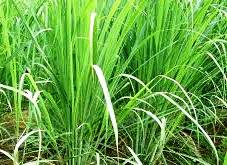नींबू घास की खेती और कीटनाशक के रूप में उपयोग
Lemon grass (Cymbopogan flexuosus) is native aromatic tall sedge belongs to Poaceae which grows in many part of tropical and sub tropical South East Asia and Africa. Lemongrass was introduced in India about a century back and now it need to be commercialize in large scale.
 In India, Lemon grass natural cultivation is along with Western Ghats, Karnataka, Tamil Nadu and foot hills of Arunachal Pradesh and Sikkim. Now colder part of the world also started growing Lemongrass but due to climate it is annual crop in those regions while in warmer places it is perennial crop..
In India, Lemon grass natural cultivation is along with Western Ghats, Karnataka, Tamil Nadu and foot hills of Arunachal Pradesh and Sikkim. Now colder part of the world also started growing Lemongrass but due to climate it is annual crop in those regions while in warmer places it is perennial crop..
Lemon grass is tall sedge with dense fascicles of leaves from a short rhizome. The culm is stout, erect upto 1.8 m high, leaves are long, glaucous, and green, linear tapering upwards and along the margins. The inflorescence is a long spike about one meter in length, flowers borne on decompounds spatheate, panicles 30 to over 60 cm long.
Pesticide control through Lemon Grass
Consumption of pesticide increases drastically after green revolution. These pesticides directly indirectly affects plant, soil and all living organism depend on plants. Soil has capability to recover itself at some extent but undefined use of pesticide disturbed the soil ecosystem. Disturbed ecosystem affects soil microorganism, soil and plant mechanism.
The only remedy to solve this problem is to use bio-pesticides. Gujarat Government proposed the bio pesticide formation unit from Neem in Gujarat Vibrant Programme in 2017. These bio pesticide are less toxic, targeted the related pests, safe and do not effect plant and their productivity.
Lemon grass extract is effectively used in controlling Thrips (Trybomb), Green Peach Aphid, Flies (Stomoxys calcitrans) , Pseudococoos Bromilia (Mayagi bug), Leaf Blight, Aspergillous Niger, Bug (Hallomorpha Hills), Termite (Coptotermes formosanus)
Cultivation of Lemon grass
It is propagated through seed raised in nurseries and also vegetatively propagated by splitting the clumps into slips. It can grown in barren land and possess capability to grow in alkaline soil which have approximately pH 9.6. This cash crop can be grow around the field or as main crop.
Harvesting of Lemon grass
First harvesting is done after 4-5 month of sowing next is done at the interval of 3-4 month. Take care in harvesting the lemongrass because its stalk which is underground part is also edible. Leaves can harvest after sufficient grown.
Varieties of Lemon grass
Presently Lemon grass grown varieties are Sugandhi, Pragati, Praman, Jama Rosa, RRL 16, CKP 25, OD 408, and Kaveri.
Reason for Lemon grass Production
Now a day’s several plants are used as biopesticide but lemon grass cultivation for pesticide has great advantage due to its multipurpose properties. Lemon grass has citral and Geranol compound which work as pesticide
Apart from biopesticide lemongrass is used in perfume industry, soap industry, cosmetics, beverages, medicine. Lemongrass has used in preparing vitamin A, vitamin B1, vitamin B2, vitamin B3, vitamin B5, Vitamin B6, vitamin C, follate, calcium, phosphorus, magnesium, copper and iron because it is the good sources of the following.
Apart from these it produces natural citral. Cultivation and Extraction of pesticide from lemon grass is quite easy and cheaper. Lemongrass can grow easily in warm and dry climate and do not need much care.
Utility of Lemon grass
- Lemon grass used in perfume, oil, soap etc due to scent possession.
- Lemon grass used to clean floor due to disinfectant properties.
- Lemon grass is used to give relief from stomach trouble.
- Lemon grass used in cosmetics, face cream, pimple creams, lotion etc.
- Lemon grass used as pesticide because it’s chemical creates obstrucle in insect reproduction.
- Lemon grass relaxed the muscles and helps in calming.
- Lemon grass used in medicines and drugs such as in cancer, reduce cholesterol, act as analgesic, reduce infection, for dental problems etc.
- Lemon grass assists in metabolism.
- Lemon grass helps in breaking and oxidation of fatty acid which helps in losing the weight.
- Lemon grass used in different cold and hot beverages.
- Lemon grass used to make citronella candles widely used to repel mosquitoes.
- Lemon grass is quite effective against ticks, aphids, grass bagworm, gnats, termites and dust mites.
Preparation of Lemon grass extract
There are two popular and easy methods to extract the lemon grass
First methods
- Cut the lemongrass leaves into small pieces.
- Add olive oil in sufficient water with those lemon grass leaves and keep for boiling.
- Keep away all the utensil of cooking and drinking.
- Collect steams from the mixture with the help of pipe connected with collecting container.
- Spray those collected portion into the field.
- Cover the nose and eyes properly.
Second method
- Harvest the lemon grass leaves and sundry properly.
- Make it powder of dried lemongrass leaves
- Dissolve 300 gm lemon grass leaves powder in 1000ml ethanol and stand the mixture for 24 hrs.
- Partially cover the mixture to expel the oil from mixture.
- Filter it with fine cotton cloth
- Boil it the filtrate and collect the steam for further use.
- Keep the extract in the air tight flask to prevent the escape of active ingredients and stored in a refrigerator until needed.
Conclusion
Lemon grass is multi potential crop and can be cultivated without much affords. Awareness among farmers for lemongrass is very essential to benefit them. They may grow lemongrass as a main crop or around the other crops for enhance the income.
Authors:
Ms.Shulbhi Verma
Department Of Biotechnology
College of Basic Science and Humanities
SD Agricultural University, S.K Nagar, Gujarat
Mail id:
